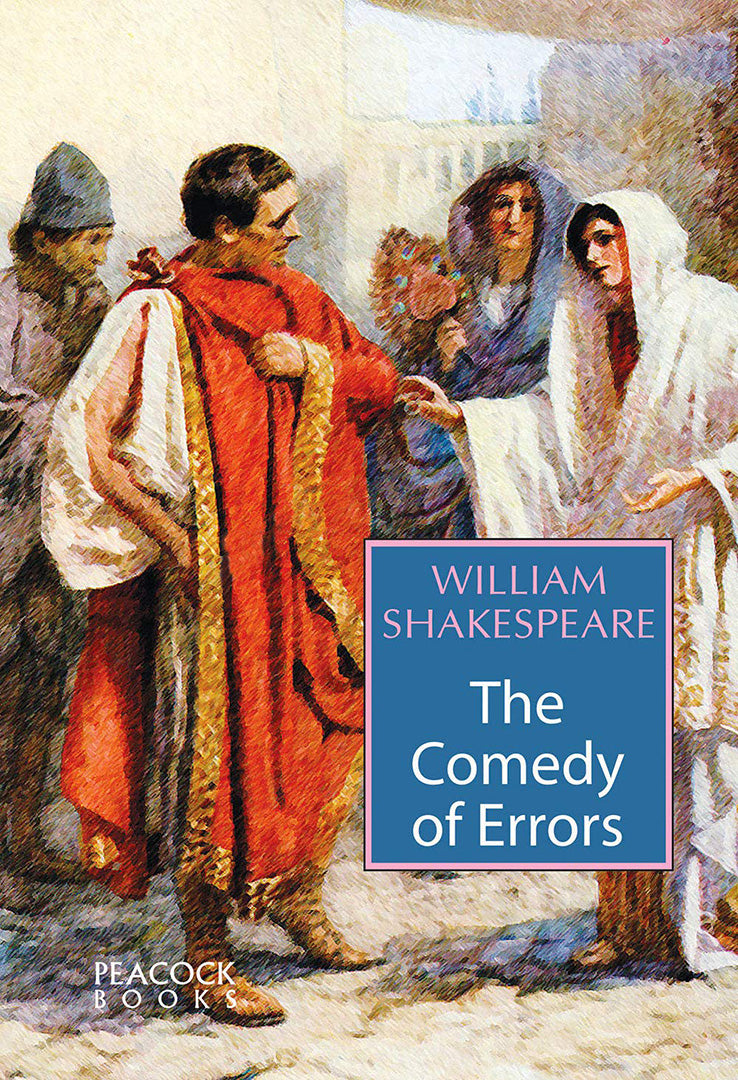The Comedy of Errors
The Comedy of Errors
William Shakespeare
Couldn't load pickup availability
Share

More Information
- ISBN13:
- Publisher: Atlantic Publishers & Distributors (P) Ltd
- Publisher Imprint: Peacock Books
- Publication Date:
- Pages: 98
- Binding:
- Item Weight:
- Original Price:
About The Book
The Comedy of Errors, in five-acts, is one of the shortest and most lively of Shakespeare’s comedies. It was written during 1589—94 and first published in the First Folio of 1623 from Shakespeare’s manuscript. It is based on Menaechmi by Plautus, with additional material from Plautus’ Amphitruo (or Amphitryon) and the story of “Apollonius of Tyre”. Its comic confusions derive from the presence of twin brothers, unknown to each other, in the same town. It engages the audience in puns, pranks, and slapstick humor; and its twists of plot provide suspense, surprise, expectation, and exhilaration and reveal Shakespeare’s mastery of construction. It has been adapted for opera, stage, screen, and musical theatre numerous times worldwide. In the centuries following its premiere, the play’s title has entered the popular English lexicon as an idiom for “an event or series of events made ridiculous by the number of errors that were made throughout”.
Set in the Greek city of Ephesus, this play tells the story of two sets of identical twins who were accidentally separated at birth without their knowledge. Antipholus of Ephesus and Antipholus of Syracuse are one set of separated twin brothers, born of Egeon and Emilia. Their servants are Dromio of Ephesus and Dromio of Syracuse, twin brothers that each serve their respective Antipholus and are also unaware of existence of the other. Antipholus of Syracuse and his servant, Dromio of Syracuse, arrive in Ephesus, which turns out to be the home of their twin brothers, Antipholus of Ephesus and his servant, Dromio of Ephesus. When the Syracusans encounter the friends and families of their twins, a series of wild mishaps based on mistaken identities lead to wrongful beatings, a near-seduction, the arrest of Antipholus of Ephesus, and false accusations of infidelity, theft, madness, and demonic possession.
About The Author
William Shakespeare, byname Bard of Avon or Swan of Avon, (26th April, 1564, Stratford-upon-Avon, Warwickshire, England—23rd April, 1616, Stratford-upon-Avon), was English poet, dramatist, and actor. He is often called the English national poet and considered by many to be the greatest dramatist of all time. He occupies a position unique in world literature. Other poets, such as Homer and Dante, and novelists, such as Leo Tolstoy and Charles Dickens, have transcended national barriers, but no writer’s living reputation can compare to that of Shakespeare, whose plays, written in the late 16th and early 17th centuries for a small repertory theatre, are now performed and read more often and in more countries than ever before.
William Shakespeare was the eldest son of John Shakespeare, a prosperous glover and local dignitary, and Mary Arden, the daughter of a wealthy farmer. There are no records of his education, but he probably went to King’s New School—a reputable Stratford grammar school where he would have learned Latin, Greek, theology, and rhetoric—and may have had a Catholic upbringing. He might have seen plays by the travelling theatre groups touring Stratford in the 1560s and 70s. At the age of 18, he married Anne Hathaway, and the couple had three children—Susanna Hall, Hamnet Shakespeare, and Judith Quiney.
Shakespeare’s works span tragedy, comedy, and historical works, both in poetry and prose. His extant works, including collaborations, consist of approximately 38 plays, 154 sonnets, two long narrative poems, and a few other verses, some of uncertain authorship. These writings were brought together in what is known as the First Folio. His plays have been translated into every major living language and are performed more often than those of any other playwright.
Although Shakespeare is the most-recognised playwright in the world, very little of his life is actually known. No known autobiographical letters or diaries have survived to modern day, and with no surviving descendants, he is a figure both of magnificent genius and mystery. By 1592, he was well-known enough as a writer and actor to be criticized by jealous rival Robert Greene as an “upstart crow” and “Johannes Factotum” (a “Johnny do-it-all”) in his pamphlet Groats-worth of Wit. Although it is difficult to determine the chronology of his works, it is likely that by 1592 he had authored 11 plays, including Romeo and Juliet, Richard III, and A Midsummer Night’s Dream.

